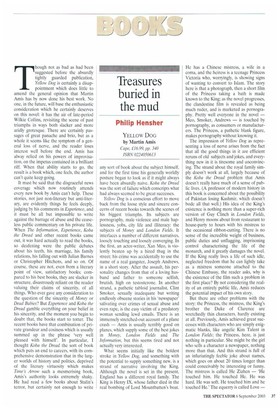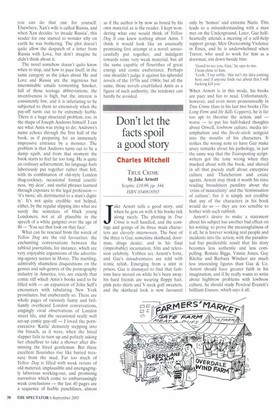Treasures buried in the mud
Philip Hensher
YELLOW DOG by Martin Amis Cape, £16.99, pp. 340 ISBN 0224050613 Though not as bad as had been suggested before the absurdly tightly guarded publication, Yellow Dog is certainly a disappointment which does little to amend the general opinion that Martin Amis has by now done his best work. No one, in the future, will base the enthusiastic consideration which he certainly deserves on this novel: it has the air of late-period Wilkie Collins, revisiting the scene of past triumphs in ways both slacker and more aridly grotesque. There are certainly passages of great panache and brio, but as a whole it seems like the symptom of a general loss of nerve, and the reader loses interest well before the end. Amis has alway relied on his powers of improvisation, on the impetus contained in a brilliant riff. When that ability starts to go, the result is a book which, one feels, the author can't quite keep going.
It must be said that the disgraceful news coverage which now routinely attends every new book by Amis can't help. These stories, not just non-literary but anti-literary, are evidently things he feels deeply, judging by his comments in Experience, and it must be all but impossible to write against the barrage of abuse and the ceaseless public commentary on his private life. When The Information, Experience, Koba the Dread and other recent books came out, it was hard actually to read the books, so deafening were the public debates about his teeth, his marriage, his family relations, his falling out with Julian Barnes or Christopher Hitchens, and so on. Of course, these are not, even from a literary point of view, satisfactory books; compared to his best books, they are slacker in structure, disastrously reliant on the reader valuing their claims of sincerity, of all things. Who ever gave any consideration to the question of the sincerity of Money or Dead Babies? But Experience and Koba the Dread gamble everything on your belief in his sincerity, and the moment you begin to doubt that, the books start to totter. The recent books have that combination of private grandeur and cosiness which is usually summed up in the phrase 'very well pleased with himself'. In particular, I thought Koba the Dread the sort of book which puts an end to careers, with its comprehensive demonstration that in the larger worlds of history and politics, deprived of the literary virtuosity which makes Time's Arrow such a mesmerising book, Amiss authority looks extremely shaky. He had read a few books about Stalin's terror, but certainly not enough to write any sort of book about the subject himself, and for the first time his generally worldly posture began to look as if it might always have been absurdly naive. Koba the Dread was the sort of failure which conscripts what had always seemed to be great successes.
Yellow Dog is a conscious effort to move back from the loose style and sincere concerns of recent books towards the scenes of his biggest triumphs. Its subjects are pornography, male violence and male haplessness, yobs, city life and illiteracy: the subjects of Money and London Fields. It interlaces a number of different narratives, loosely touching and loosely converging. In the first, an actor-writer, Xan Meo, is violently beaten up by a hired thug in the street; his crime was accidentally to use the name of a real gangster, Joseph Andrews, in a short story. After the assault, his personality changes from that of a loving husband and father to someone selfish, brutish, high on testosterone. In another strand, a pathetic tabloid journalist, Clint Smoker, sexually inadequate but writing endlessly obscene stories in his 'newspaper' salivating over crimes of sexual abuse and even rape, is the easy victim of a predatory woman sending lewd email& There is an immensely stretched-out account of a plane crash — Amis is usually terribly good on planes, which supply some of the best jokes in Money, London Fields and The Information, but this seems tired and not actually very interested.
What seems initially like the boldest stroke in Yellow Dog, and something with the potential to supply something new, is a strand of narrative involving the King. Although the novel is set in the present, England has a different royal family. The King is Henry IX, whose father died in the real bombing of Lord Mountbatten's boat. He has a Chinese mistress, a wife in a coma, and the heiress is a teenage Princess Victoria who, worryingly, is showing signs of wanting to convert to Islam. The story here is that a photograph, then a short film of the Princess taking a bath is made known to the King; as the novel progresses, the clandestine film is revealed as being much ruder, and is marketed as pornography. Pretty well everyone in the novel — Meo, Smoker, Andrews — is touched by pornography, as consumers or manufacturers. The Princess, a pathetic blank figure, makes pornography without knowing it.
The impression of Yellow Dog as representing a loss of nerve arises from the fact that all the good things in it are efficient reruns of old subjects and jokes, and everything new in it is tiresome and unconvincing. The strand about the royal family simply doesn't work at all, largely because of the Koba the Dread problem that Amis doesn't really have much of a sense of public lives. (A professor of modern history in this book is concerned about the possibility of Pakistan losing Kashmir, which doesn't bode all that well.) His idea of the King's existence is nothing more than a super-rich version of Guy Clinch in London Fields, and Henry moons about from restaurant to house-party to hours with his mistress to the occasional ribbon-cutting. There is no sense of the incredible weight of business, public duties and unflagging, imprisoning control characterising the life of the monarch, and it greatly damages the novel. If the King really lives a life of such idle, neglected freedom that he can lightly take as a mistress someone attached to the Chinese Embassy, the reader asks, why is the existence of the film such a problem in the first place? By not considering the reality of an entirely public life, Amis reduces the potential impact of his own story.
But there are other problems with the story: the Princess, the mistress, the King's brother the Duke of Clarence are wretchedly thin characters, hardly existing at all. Previously, Amis achieved great successes with characters who are simply enigmatic blanks, like angelic Kim Talent in London Fields; the Princess, here, is just nothing in particular. She might be the girl who sells a character a newspaper, nothing more than that. And this strand is full of an infuriatingly feeble joke about names, which goes on about 20 times longer than could conceivably be interesting or funny. The mistress is called He Zizhen — 'He touched him. He touched He. He was hard. He was soft. He touched him and he touched He.' The equerry is called Love — you can do that one for yourself. Elsewhere, Xan's wife is called Russia, and when Xan decides 'to invade Russia', this reader for one started to wonder why on earth he was bothering. The plot doesn't quite allow the despatch of a letter from Russia with Love, but don't imagine he didn't think about it.
The novel somehow doesn't quite know when to stop, and how to pace itself; in the same category as the jokes about He and Love and Russia are the ingenious but interminable emails tormenting Smoker, full of those teenage abbreviations; the inventiveness is high, but the interest is consistently low, and it is infuriating to be subjected to them so extensively when the pay-off turns out to be extremely feeble. There is a huge structural problem, too, in the shape of Joseph Andrews himself. I can see what Amis was trying to do; Andrews's name echoes through the first half of the book, as if preparing for an immensely impressive entrance by a monster. The problem is that Andrews turns out to be a damp squib, and from that moment the book starts to feel far too long. He is quite an ordinary achievement; his language feels laboriously put together rather than felt, with its combination of old-style London thug-cockney, occasional formal courtliness, 'my dear', and useful phrases learned through exposure to the legal profession — 'it's more, uh, detrimental to a man's dignity'. It's not quite credible: not helped, either, by the regular slipping into what are surely the sentences of black young Londoners, not at all plausible in the speech of a white gangster over the age of 80 — 'You see that look on they face'.
What can be rescued from the wreck of Yellow Dog are the old favourites: the enchanting conversations between the tabloid journalists, for instance, which are very enjoyable expansions of the advertising-agency scenes in Money. The startling, admirably shameless disquisitions on the genres and sub-genres of the pornography industry in America, too, are exactly that comic riff which Amis's books used to be filled with — an expansion of John Self's encounters with tabulating New York prostitutes, but exuberantly so. There are whole pages of viciously funny and brilliantly overheard London conversations, zingingly vivid observations of London street life, and the occasional really well set-up comic pay-off — I loved the pornexecutive 'Karla' demurely stepping into the breach, as it were, when the hired slapper fails to turn up and politely asking her chauffeur to take a shower after dismissing the hired gentleman. But these excellent flourishes rise like buried treasure from the mud. Far too much of Yellow Dog is filled with weak reruns of old material, implausible and unengagingly laborious working-out, and promising narratives which come to embarrassingly weak conclusions — the last 40 pages are a sequence of feeble punchlines, almost as if the author is by now as bored by his own material as is the reader. I kept wondering what one would think of Yellow Dog if one knew nothing about Amis. I think it would look like an unusually promising first attempt at a novel: unsuccessfully put together, and indulgent towards some very weak material, but all the same capable of flourishes of great energy and comic exuberance. Perhaps one shouldn't judge it against his splendid novels of the 1970s and 1980s; but all the same, those novels established Amis as a figure of such authority, the tendency can hardly be avoided.











































































 Previous page
Previous page